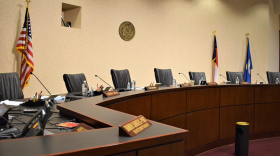The State Employees Association of North Carolina (SEANC) advocates for North Carolina's state government workers. It recently cut ties with the national State Employees International Union.
The two groups had been affiliated for 15 years. But when the larger union sent its other members to a “Moral Monday” protest in North Carolina to push back against Republican legislation, it created a rift.
WUNC Capitol Bureau Chief Colin Campbell spoke with Ardis Watkins, the executive director of SEANC, about the decision to make the split.
This interview has been lightly edited for clarity and brevity.
What was the reasoning for SEANC to disaffiliate from that large organization that you'd been a part of for over a decade?
Watkins: “So, our Board of Governors – it's made up of SEANC members who are elected from their districts all around the state – and they unanimously felt that, for some time now, we've been going in sort of opposite directions from SEIU as an organization, in terms of how we go about doing our lobbying work for state employees, how we view the labor movement in North Carolina. And it was time in their opinion to not be part of the same organization. There's no animosity, nobody's mad, but we feel like we function better as an independent association.”
Does this stem from the fact that SEIU has taken sort of a more aggressive approach in terms of being involved in public protest? And does that harm what SEANC is trying to do here at the state level in terms of working alongside lawmakers to get your agendas enacted?
Watkins: "I think it can absolutely be harmful, because over the years – and there's just been an accepted us versus them mentality with labor and employers’ business – that makes no sense to us because we're not anti-business. And we don't think business should be anti-worker; that's ridiculous and we can't all thrive if it's that way. That's the way everything is now in society, people want to be, you know, all one way or all another. Our members are not. They're pretty representative of North Carolinians. And, frankly, that's why I think they do so well when they make political predictions…
“So, I think that what we see is the need to partner more with businesses. And when you do that, oftentimes you can find such common ground. I think mental health is one of those issues, where businesses are experiencing problems that have been caused by the lack of proper infrastructure based around mental health. Instead, employees deal with that in their work, oftentimes every day. And it's one of those areas where I think partnering with business, we can do a lot of good to try to make sure that issue stays at the forefront. So, there's so many issues like that, that are affecting business and affecting state employees the same, and we want to work with everybody, other labor groups, business, anybody that's trying to make things better for North Carolinians.”
North Carolina typically is known as a particularly anti-union state across the board. Has it been a challenge for SEANC over the years to make the case that, while you’re representing state employees in a way that – in another state – a union might, though your organization's not actually a union?
Watkins: “We've only operated in our environment, where you can join a union, but you can't have collective bargaining, obviously, as a public employee due to law. And years ago, we tried to get that law changed, when there was a democratic supermajority, as a matter of fact, and we were not successful in moving that bill. But the bottom line is, it's been our experience, people wanted to join our organization anyway. So, it really didn't matter whether we had collective bargaining agreements, whether we were part of a union; we know how to collectively get together and express what we need to the legislature to do our jobs. And in many cases, we've been able to be successful. We were the first state in the country to get $15 an hour minimum wage for public workers, and it was out of a Republican supermajority. But we were the first group in the country to do that. So, we think it's quite effective to work the way we work.”
Has that translated to the membership of SEANC? Have you seen strong support from a large percentage of state employees that want to join or are supportive of the work that you guys do?
Watkins: “Yeah, I definitely feel that way. I mean, we still hear that. Some people will tell you, ‘I don't have to join because you're already doing the work for me.’ And that is absolutely correct. They're not wrong. But most people that we talk to, when they find out about SEANC say, ‘I want to have a voice,’ because state employees don't feel comfortable usually with the idea of coming and talking to lawmakers themselves… They love that someone else will go do that, who doesn't have to worry about ‘What's going to happen to me on the job site if I speak out?’ And that's what we're here for. We're here to be a voice for folks who do good work for the public and need somebody to make the case for them.”







